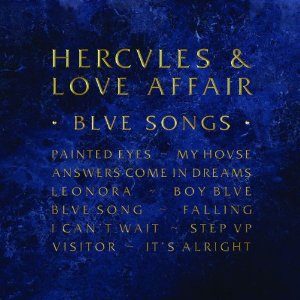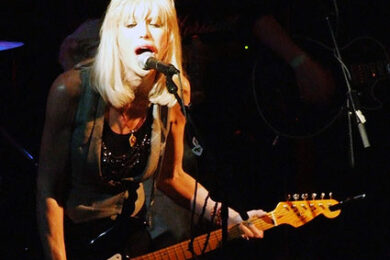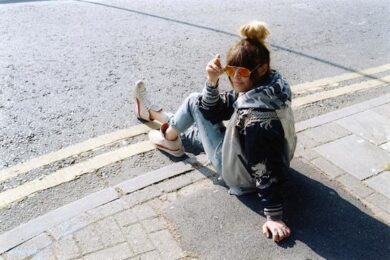Following up a critically acclaimed debut album is traditionally a tricky business. A band that has come up with something genuinely fresh and exciting might struggle to push their sound forward, or simply decide that the easier option is to stick to what they know already works; on the other hand, if their first outing was commercially successful, the pressure from their record company to cash in quickly might stifle creativity. Thankfully Andy Butler – the driving force behind retro-future dance crew Hercules And Love Affair – is not only the kind of guy to do things differently, but also the kind to do them the hard way. Their self-titled 2008 debut charted in several countries, spawned a genuine worldwide club hit, and was named Breakthrough Album of the Year by the New York Times. For their "difficult" second record, however, Butler and friends have cast aside their most famous collaborator, traded in a hip producer for an older model and severed ties with the label that helped launch them. There’s a fine line between risk and recklessness, but Blue Songs walks it with the grace and balance of a high-wire acrobat, proving the old adage about fortune favouring the brave.
So, briefly, the changes: firstly, Hercules And Love Affair are no longer a DFA band. After a prolonged – and possibly enforced – gestation period (the album was finished and ready to go almost a year ago), Blue Songs is now being released on Butler’s own imprint, MR INTL, in collaboration with UK label Moshi Moshi. There’s more change too. Conspicuous by his absence is Antony Hegarty, vocalist on the band’s biggest hit (‘Blind’) and a heavyweight presence on half the tracks on H&LA, whose own career commitments left him unavailable for Blue Songs’ recording. Replacing him here are fan-turned-member Shaun Wright and Venezuelan performance-art diva Aerea Negrot, along with the returning Kim Ann Foxman, Butler himself and – on ‘Step Up’ – Bloc Party’s Kele Okereke.
It’s a testament to Butler’s growing confidence as a writer that he’s been able to take what started out, essentially, as a collaboration with Hegarty and fashion it into something so individual. Whereas H&LA was viewed by some as simply a DFA disco album with Antony on diva duty, Blue Songs refuses to be so easily pigeonholed. The 1970s stylings that characterised the debut are largely absent, replaced by a wider selection of late-80s and 90s party vibes; opener ‘Painted Eyes’, with its ascending bass runs and sawing strings, may glide along like a steroid-pumped Boney M, but it’s a misleading introduction to an album that draws mainly from early underground house and techno. If H&LA sometimes exuded an air of historical reverence, here the group skim-read through the next twenty years, scribbling across the pages as they go. Blue Songs is, above all, a fun album, in thrall to the spirit of early raves and warehouse parties, alive with the same adventurous energy and ecstatic abandon.
Lead-off single ‘My House’ is the perfect example of this new, more electronic direction, with Wright’s soulful vocal sitting atop a jacking house rhythm and twinkling arpeggios. While the Chicago sound undeniably informed moments of H&LA, only ‘You Belong’ made that connection explicit, its mechanical thump and spiky synths standing apart from the rest of the album’s gentler, live-band feel. Conversely, most of Blue Songs was constructed using producer Pulsinger’s classic Roland gear, and the iconic sounds of the 808, 303, 606 and 101 are now omnipresent. Stuttering beats, cut-up vocal samples, squelching bass and a myriad selection of bleeps and bloops dominate numbers like ‘Step Up’ and the Foxman-led ‘I Can’t Wait’, while ‘Falling’ and Negrot showcase ‘Answers Come In Dreams’ upgrade the band’s disco obsession with Frankie Knuckles-style percussive embellishments, soft synth washes and subtle brass and woodwind interjections. ‘Visitor’, meanwhile, introduces elements of Detroit techno; a sleek, minimal bass-line and skipping hi-hats driving the track through its twisting chord changes and otherworldly, pitch-shifted vocal refrains.
As with H&LA, Blue Songs has its calmer moments too. Closer ‘It’s Alright’ is a slow-burning tone-poem, Kim Ann Foxman eulogising the healing power of music over a collage of piano and swirling electronics. Butler takes centre-stage on ‘Leonora’ and the beautiful ‘Blue Song’, the former a seductive, down-tempo house mutation with some glorious Foxman harmonies; the latter an almost horizontal mood-piece which finds Butler’s multi-tracked vocals set against a backdrop of skeletal bass, shuffling tuned percussion and soothing woodwind flutters. Gentler still is ‘Boy Blue’, which forgoes rhythm altogether letting Shaun Wright’s rich tones float freely over finger-picked guitars and subtle synth oscillations. Each of these songs – particularly ‘Blue Song’ – display an avant-pop sensibility that recalls the work of one of Butler’s biggest influences, Arthur Russell, although the fact that the latter three are grouped together in the middle of the album creates something of a lull, disrupting the record’s overall momentum. It’s a minor complaint, though, especially considering the bounty of subtle charms Blue Songs has to offer.
Ultimately, Blue Songs is a resounding success. It’s difficult to see the critics going mad for it in the same way as they did for H&LA, but only because the shock of the new has subsided; for all the changes, it still sounds very much like the same group. Butler’s song-writing skills continue to grow, and – vitally – the risky decisions have all paid off. Thanks to Butler’s keen eye for new talent, Antony is not missed at all, and in Wright in particular he has found a vocalist with huge future potential. Patrick Pulsinger, not the most obvious choice of "big name" producer, brings a number of surprisingly varied ideas to the table; and the move away from DFA – and with it guaranteed sales and credibility – seems almost inconsequential given the rock-solid reputation the band have built for themselves. Displaying equal understanding of the art of pop music, and pop music as art, Hercules And Love Affair have created an album that actually delivers on the promise of its predecessor; they may have burned a few bridges along the way, but these Blue Songs are the perfect soundtrack for dancing on the ashes.





